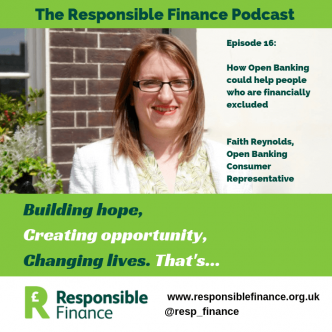What is Open Banking and how can it help people who are financially vulnerable and financially excluded, including people who are unbanked?
 How can Open Banking benefit businesses, social enterprises and the self-employed?
How can Open Banking benefit businesses, social enterprises and the self-employed?
How will Open Banking help Responsible Finance providers (and credit unions) – and what should they be doing and thinking about?
And is there a danger that Open Banking might facilitate discrimination against people who are already financially vulnerable?
Faith Reynolds is the Open Banking Consumer Representative. She’s part of a steering group responsible for delivering the technology that underpins the Open Banking initiative.
Faith joins us in the latest episode of the Responsible Finance podcast to answer these questions and more.
Click the green arrow to play the podcast, use the downward arrow to download it, or access it through Apple Podcasts / iTunes. Full timings and notes to navigate to different parts of the podcast are below.
Timings
- 1:00 Introduction.
- 2:00 What is Open Banking? A couple of examples of how and why you might choose to share your data – and an introduction to payment initiation.
- 4:45 Aggregating financial information into one place.
- 5:10 How does the technology work? How do people control who has access to their data?
- 7:07 firms accessing Open Banking data need to be registered and approved by the FCA and Open Banking.
- 8:55 If providers don’t continue to meet regulations what penalties could be imposed? And what happens if money leaves your account which you’ve not authorised?
- 10:00 What about data breaches?
- 11:00 How to protect yourself from scams.
- 12:15 What questions should you ask of firms wanting access to your data through Open Banking?
- 15:55 Somewhere along the line a service has to be paid for, so find out how.
- 17:26 How can Open Banking help people who are financially excluded?
- 20:35 The concept of digital pots and spending alerts can help people budget more effectively.
- 22:28 Debt advice can be made easier through Open Banking, says Reynolds.
- 23:50 How biometrics could be used to help create more financial inclusion.
- 24:30 What about people with no bank account?
- 26:00 Jam-jarring to allocate money to different budgets.
- 27:30 Payment initiation can also help people with low and fluctuating incomes, as it’s more flexible than direct debits.
- 28:50 A future scenario: combining financial, energy use and other data could alleviate fuel poverty.
- 30:10 How can Open Banking benefit businesses, social enterprises and the self-employed?
- 32:10 Payment initiation can be a much less expensive way for small businesses to accept card payments – saving alot of money.
- 33:10 “Request to Pay” could also deal with late payment issues, says Faith.
- 34:20 How will Open Banking help Responsible Finance providers (and credit unions) – and what should they be doing and thinking about?
- 37:49 Will Open Banking facilitate discrimination against, or penalties for, the financially vulnerable?
- 41:52 What developments will we see in Open Banking over the next 12-24 months?
- 43:00 And which of these will be most relevant to responsible finance providers?
- 43:50 Faith has a long-term commitment to financial inclusion. How has this influenced her work?
- 47:57 Wrapping up.
What next?
- Find the Open Banking website here and the list of regulated providers here.
- Read about topics covered and listen to previous episodes on our website or in iTunes.
- Please share the podcast, tell others about it, and ideally leave a rating or review on iTunes so other people can learn about the work and impact of responsible finance providers.
- Find your nearest responsible finance provider: www.findingfinance.org.uk
- And if you’re a responsible finance provider or a client and you’d like to put yourself forward to be on the show, get in touch – email podcast producer, Jamie Veitch.
